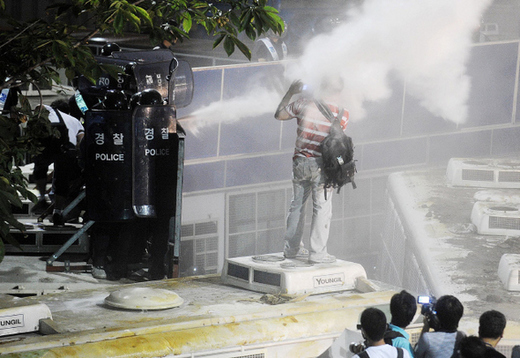New beef agreement still leaves room for mad cow fears
The Hankyoreh | 23 June 2008
New beef agreement still leaves room for mad cow fears
U.S. agrees to promote voluntary age verification system among beef exporters

While the government claims it has made a “better-than-expected achievement” through additional negotiations between South Korean Trade Minister Kim Jong-hoon and U.S. Trade Representative Susan Schwab over import terms for U.S. beef, it hasn’t been enough to defuse public fears over the safety of the American meat.
According to the results of an additional week of South Korea-U.S. negotiations, released by the government on June 21, the United States has agreed to adopt an age verification system called a “quality system assessment” program, which would encourage U.S. meat exporters to export beef from cattle aged less than 30 months to South Korea.
The QSA program, however, is a voluntary restriction. In addition, the new terms allow the U.S. to export beef containing intestines and backbones to South Korea. These parts are categorized as special risk material and are considered to pose a greater risk of mad cow disease.
A controversy is brewing because of differences between South Korea and the United States on how long they will ban trade of beef from cattle aged 30 months and older.
The South Korean government said, “Imports of beef from cattle more than 30 months old will be banned indefinitely until the trust of South Korean consumers improves.”
On the contrary, U.S. Trade Representative Susan Schwab said, “Korean beef importers and U.S. exporters have reached a commercial understanding that only U.S. beef from cattle under 30-months of age will be shipped to Korea, as a transitional measure, to improve Korean consumer confidence in U.S. beef. At the request of U.S. exporters, once the protocol goes into effect, the U.S. government will facilitate this transitional private sector arrangement.” Schwab’s comments clarified that the outcome of the additional beef negotiation is a temporary measure ahead of a full resumption of U.S. beef exports to South Korea.
Meanwhile, there were some improvements in measures to protect the South Korean government’s quarantine authority, but the United States still has the power to grant export licenses to its beef-processing plants. At the same time, Article No. 5 in the sanitary rules for U.S. beef imports, which allows South Korea to ban imports of U.S. beef only if the World Organization for Animal Health downgrades the United States from its current status as a risk-controlled country for mad cow disease, even if a new case of mad cow disease is found in the United States, remains intact.
In response to the outcome of the additional round of negotiations, the People’s Countermeasure Council against Full Resumption of Imports of U.S. Beef Endangered with Mad Cow Disease renewed its demand for renegotiation of the agreement, saying, “It’s a deception because it is still far from a deal that guarantees people’s life and safety.”
The Lawyers for a Democratic Society held an emergency press conference on June 22, during which they said, “The U.S. Department of Agriculture’s ‘quality system assessment’ program isn’t directly related to quarantine control, but linked to a program that provides guidelines for quality, management and sales. Since only some 30 private U.S. companies will carry out the program for the U.S. government, the safety of beef won’t be guaranteed.”





